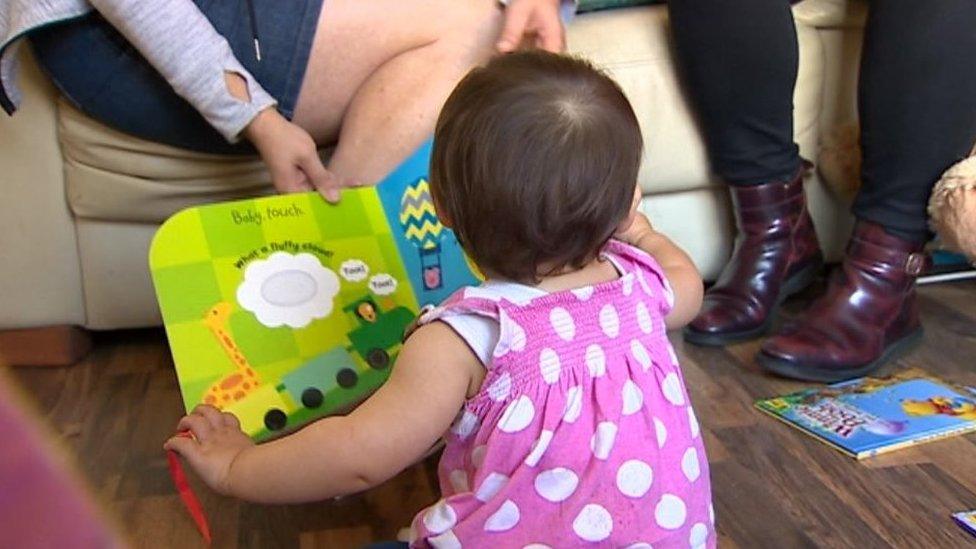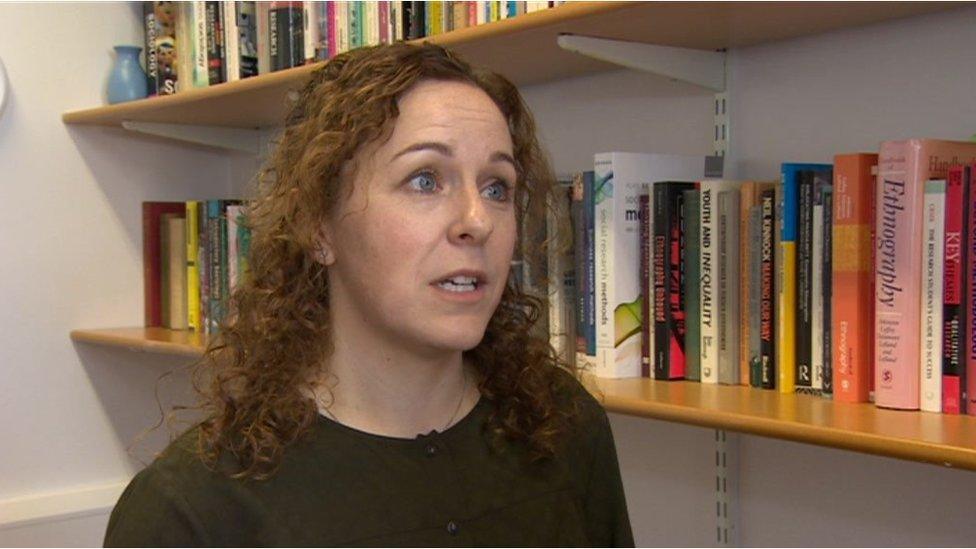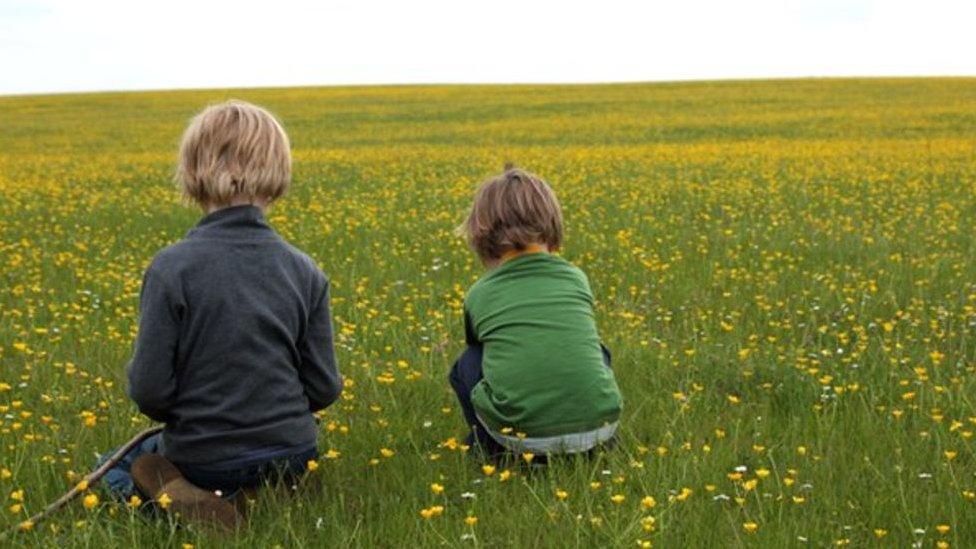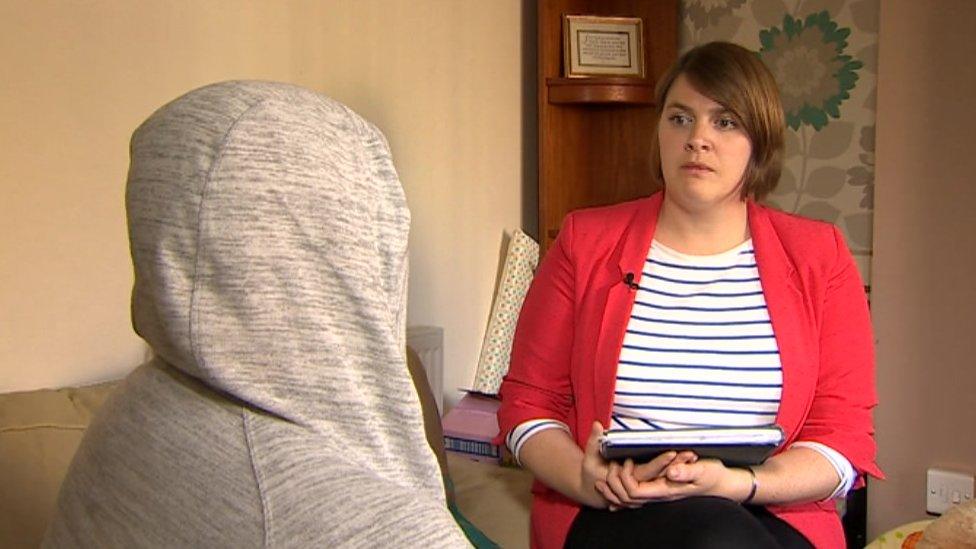Care leavers who become parents 'need more support'
- Published

More support is needed for young care leavers when they become parents to prevent their children from being taken into care, the Children's Commissioner for Wales says.
These parents are over-represented in families where children are removed and feature more in child protection cases.
Dr Sally Holland said ministers needed to invest in services.
The Welsh government says it is developing a national programme for looked-after children and care leavers.
Dr Holland said: "It's an issue that has been raised to me by young people themselves who are care leavers and parents.
"They say that some of them feel that they are treated a bit differently, because they've been in care they're judged at a different level because people have an expectation of them to fail."
She added research being done into adoption by Cardiff University showed a high proportion of children being placed for adoption after one year in Wales had at least one parent who was a care leaver.
"I find it very sad that the children that we've taken into care to look after and try to give a better life, we haven't been able to help them be successful parents.
"Ideally we'd want to help them early enough and provide them with enough support so that they can go on to lead happy and successful adulthoods and start their parenthood when they're ready and to be able to provide the kind of family life that they would want for their children."

Powerless

Dr Louise Roberts, an academic at Cardiff University is conducting research to find out more about the experience of young parents who have been in care themselves.
She said some parents faced a dilemma when asking for help.
"If they go to their parent - the state and social services - and ask for that support, they inadvertently risk raising concerns about their ability to be adequate parents.
"Some parents are really fearful of going and approaching the people who are there to support them and being honest about their needs."
She said some young people she had spoken to who had had their children removed felt an overwhelming sense of injustice.
They said they felt powerless to stop the system they felt had failed them from being involved in the lives of their children.
She added: "It's important to remember that care leaver parents are not the same. Some will have minimal support needs as parents then others will need more comprehensive packages of support but there are challenges for local authorities in responding to those needs."

BBC Wales reported on Monday the number of court orders made by local authorities had increased by 30.7% to 430 compared with last year.
Dr Holland says the increase is concerning because families are not being helped earlier enough and she would like to see more support going on much earlier and that taking children into care through the court system "has got to be a last resort in any country.
"I think initially we would want the Welsh government to ring fence or to devote some funding to some pilot schemes to see how we can help these families better."
The Welsh Government says: "The Improving Outcomes for Children Group, chaired by David Melding, is developing a national work programme for looked after children and care leavers in Wales.
"Prevention and early intervention are key themes of this programme. This also includes developing initiatives which provide early support to families, helping to reduce repeating patterns of behaviour, such as the children of care leavers entering the care system."

One mother has turned her life around after losing five children
Lisa* (not her real name) went into care at the age of 7 and had 30 different care placements during her time in the care system.
Lisa found it hard to settle in school due to frequently changing care placements and eventually she stopped going to school.
Instead she started drinking, going missing every night, taking drugs and going out with older men.
She says she was sexually abused by two different members of staff in the same children's home but that when she reported the abuse she was not believed as she was seen as a "problem child".
Lisa says her experience of being in the care system has had a marked effect on her life.
"I've lost five of my children because of it - and because of the way I carried on living my life afterwards," she said.
Lisa had her first child at the age of 16. The baby was removed from her care after five weeks as Lisa was not able to look after her properly.
She says she did not have any parenting role models and if someone had been able to provide support and coaching in parenting it would have made a difference.
Lisa has been in prison five times during her life. The first time was when she was 15 and assaulted a member of staff at a children's home. She has also been to prison for burglary.
Lisa has had five children removed from her care altogether. She admits that after the removal of each child she got caught in a cycle of harmful behaviour:
"I was drinking, taking drugs, promiscuous behaviour, violent behaviour, I used to kick off with social workers," she said.
She says that it was following psychotherapy she realised she wanted to be a mum and her repeated pregnancies were not just due to an accident and her forgetting to take contraception.
"My oldest was an accident and the rest I would have said it was an accident, but it was only when I went to see a psychotherapist and they turned round in court and said 'I think she'll continue to have children until she's given a chance'.
"When he said that, he said psychologically, and I thought, yeah it did ring true because I'd just had my fourth child then and obviously if I didn't want them then I would have done something to stop me getting pregnant but I didn't."
Lisa says she knew before her children were born that she was not going to be allowed to keep them and that after she gave birth by Caesarian section she stayed in hospital to recover from the operation and baby was allowed to stay with her. She describes those days as "amazing".
"I used to do everything… When you've had a section they tell you not to do too much and to get the nurses to do things for you but no, I used to do everything that I could do at that point."
When the baby was taken from her after four days Lisa says it was 'heartbreaking'. She would start drinking again to cope with her loss.
Lisa says she feels failed by social services although since she has moved to a different area she says social services in her new area have given her support and the chance to be a good parent
Lisa now has a one-year-old daughter.
She admits: "I don't know why I changed all of a sudden. I don't know why I didn't do it for my other kids.
"It makes me feel guilty I didn't do it for them but when I found out I was pregnant I just thought, I can't lose another one, I can't emotionally handle losing another one so I just quit drinking, I did everything they asked of me and more."
She says being a mum in her own home is "amazing" and the best thing that has ever happened to her.
"This is the first time in my life that I'm actually proud of myself."
Lisa thinks things need to change for children in care.
"They need to stop moving people around so much because you detach from people when that happens and you just feel rejected. Next time you get moved you feel even more rejected so you end up doing stupid things, and think what's the point?" she said.
"People leaving care need more support. I know the after care system is there if you need help financially for a bus pass or something, but when it comes to learning how to do everything, they don't really help."
- Published31 October 2016

- Published1 November 2016
